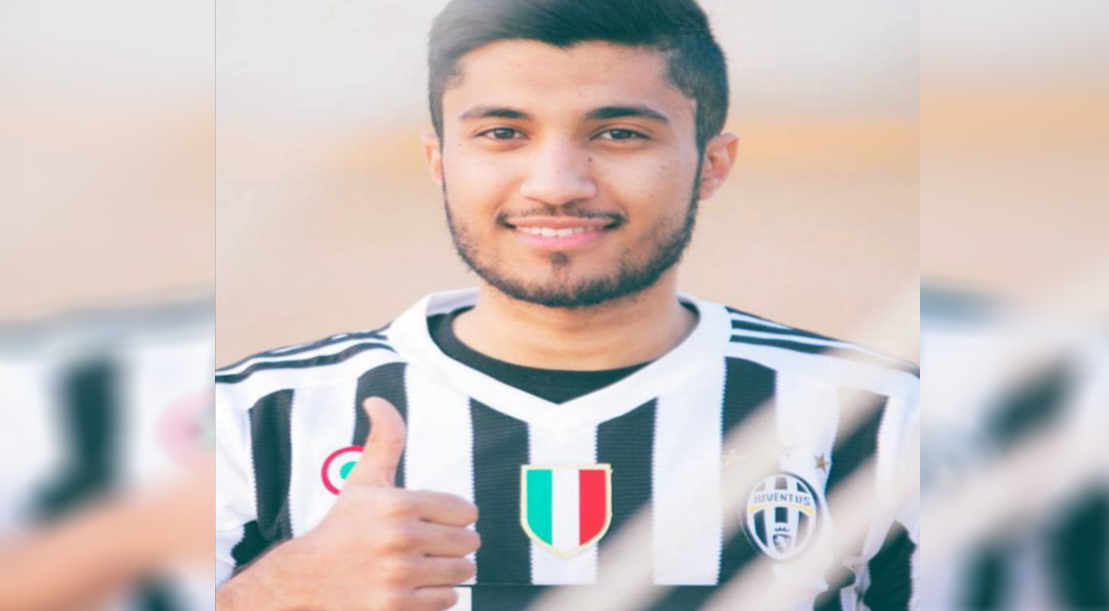Abdulla was a student and a football player for Al-Shabab Club when he was arrested in 2019, after authorities pursued him for six years for his participation in the peaceful protest and religious events demanding democracy in 2013. Since his arrest, Abdulla has been tortured and convicted in unfair trials; He is currently in Jau Prison.
On 22 September 2019, Abdulla’s family house was raided in the Diraz region. He was arrested by officers in civilian clothing including members of the Special Security Force Command and members of Criminal Investigations Directorate (CID) without any warrant. It was not the first time that Abdulla’s family house was raided in order to arrest him. For six years Abdulla was being pursued and was the target of death threats. During his arrest, officers provided Abdulla’s parents with only a summons with his name.
Abdulla was subjected to enforced disappearance for 16 days throughout which he was transferred to Building 15 of Jau Prison and then to an unknown location; he believes he was interrogated at the Royal Academy of Policing for four days during which he was blindfolded and subjected to torture. He also endured torture in Building 15 of Jau Prison. After his arrest, Abdulla was able to phone his family, but only for less than a minute; he was told to inform the family that he was at the CID, while he was in fact at Building 15 in Jau Prison. His attorney could not attend his interrogation. He was then transferred back to the CID.
On 8 October 2019, after two months of disappearance, he was sent to prison. Abdulla did not have any information or details about the charges against him because he did not have a lawyer and he did not attend a court hearing before his arrest.
During his interrogation Abdulla was subjected to different methods of torture at the CID for 3-4 days. He was forced to remove all clothing except his underwear; he was chained from the back and a piece of cloth was placed over his eyes; he was sexually harassed and hit. Abdulla was constantly beaten; he was kicked and punched on his head and back. He was forced to stand for long hours and was threatened of having his family harmed. Due to the torture Abdulla confessed and signed a statement without knowledge of its contents.
There were judgements before his arrest for which Abdulla was sentenced to a total of 18 years in prison for charges from seven separate cases. He did not receive any documents concerning the judgments that were issued and was not informed of any case. He received summons and subpoenas, but most of them did not contain the charges against him. They would only summon him to appear before the Public Prosecutions Office (POP) or the court. However, he was not taken to the PPO because all the judgments issued against him were in absentia and had become final.
There were judgments after his arrest: on 15 February 2013 Abdulla and others were accused on multiple charges: 1) assaulting a member of security forces by beating him during his job and because of it for terrorist purposes; 2) participating in a public illegal assembly with the purpose to commit crimes infringing security while using violence; and 3) possession of flammable material with the purpose of using it to endanger people’s lives or public and private funds. He was also charged for joining Saraya Al-Ashtar and military training. For these cases Abdulla was sentenced to a combined 40 years in prison, including a life sentence for joining Al-Ashtar. This last judgment was the only one made in Abdulla’s presence on 6 November 2019. This judgment was upheld on 31 December 2019.
Abdulla was denied access to his attorney and was not able to present evidence because he did not attend all court hearings. He was only driven to 2 or 3 hearings where he was transferred from prison by bus. He was kept chained in the bus and was not allowed to be present in court.
Abdulla was able to meet his parents two weeks after his arrest. He reported that he was discriminated against based on his religious sect as he is unable to practice his religion freely due to the restrictions enforced by the prison administration. These include not providing the necessary religious books and closing the place of worship in the prison block.
Abdulla had problems with his stomach and colon before his arrest and asked to see a doctor about a month after he was sent to Jau Prison, but he did not see a doctor or receive treatment. Abdulla remains in Jau Prison.
Abdulla’s treatment is in violation of Bahrain’s international human rights obligations, including the International Covenant on Civil and Political Rights (ICCPR) and the Convention Against Torture and Other Cruel Inhuman or Degrading Treatment or Punishment (CAT). Abdulla’s warrantless arrest and unfair trials are in violation of Articles 7, 9, 10 and 14, 17, 18 of the ICCPR. The torture that Abdulla has been subjected to, and especially the sexual harassment, is a significant violation of the CAT.
Americans for Democracy & Human Rights (ADHRB) calls on the governement for any retrial to be conducted in accordance with international standards for a fair trial. Additionally, ADHRB urgently calls on the Bahraini government to open an investigation into Abdulla’s allegation of torture, with a view to holding prepetrators accountable.





